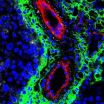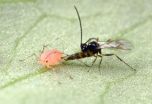(Press-News.org) Researchers at the EPFL have identified an important mechanism that could lead to the design of more effective cancer vaccines. Their discovery of a new-found role of the lymphatic system in tumour growth shows how tumours evade detection by using a patient's own immune system.
Tumour cells present antigens or protein markers on their surfaces which make them identifiable to the host immune system. In the last decade, cancer vaccines have been designed that work by exposing the patient's immune cells to tumour-associated antigens and so priming them to kill cells that present those antigens. These have caused much excitement, not least because by acting so specifically on cancer cells, they could potentially eliminate the unpleasant side effects of chemo- and radiotherapy.
Like soldiers protecting a fort
However, clinical trials of such vaccines have had a very low success rate to date, mainly because tumours have various mechanisms for evading detection by immune cells, even when those immune cells – called T cells – have been primed to seek them out. Those mechanisms are, in general, poorly understood. But in a paper to be published this week in Cell Reports, the laboratories of Melody Swartz at EPFL and Stéphanie Hugues at UNIGE provide a key insight into one of them. They describe for the first time how, like soldiers protecting a fort, lymph vessels surrounding a tumour ward off T cell attack.
Plenty of research has shown that tumours can induce the growth of lymph vessels in their vicinity, and that this growth is correlated with metastasis and poor prognosis. It was assumed that these lymph vessels simply provided an escape route for cancer cells, transporting them to distant sites. In the new study, led by postdoc Amanda Lund, the researchers show that lymph vessels actually suppress the immune response, deleting the attacking T cells or leaving them "functionally exhausted" by the time they reach the tumour.
They studied a type of tumour that expresses large amounts of VEGF-C, a molecule that is naturally expressed in humans and that stimulates lymphatic growth. Having engineered the tumour cells to express a foreign antigen, they compared the efficacy of a vaccine designed to prime T cells to kill cells carrying that antigen, either when VEGF-C was present or when its activity was blocked . With VEGF-C suppressed, the vaccine's efficacy increased and tumour growth slowed fourfold.
A weakness in cancer's defense system exploited
The researchers went on to show that the endothelial cells which line lymph vessels "scavenge" tumour-specific antigens and present them to the tumour-specific T cells in a suppressive manner. This, in turn, promotes the local deletion of those T cells. According to Prof Swartz, that means that first targeting the lymph vessels associated with a tumour could, in theory, significantly increase the efficacy of existing cancer vaccines. "It would be like removing the soldiers from around the fort before sending in your opposing army," she says. "If you disable the lymph vessels' suppressive functions, our data suggest that tumour-killing T cells would do their job a lot more effectively." Future clinical trials are needed to put that theory to the test.
INFORMATION:
Title: VEGF-C Promotes Immune Tolerance in B16 Melanomas and Cross-Presentation of Tumor Antigen by Lymph Node Lymphatics
Authors: Amanda W. Lund,1,2 Fernanda V. Duraes,3 Sachiko Hirosue,1 Vidya R. Raghavan,1 Chiara Nembrini,1 Susan N. Thomas,1,2 Amine Issa,1 Stéphanie Hugues,3,* and Melody A. Swartz1,2,
1Institute of Bioengineering (IBI), EPFL
2Swiss Institute for Experimental Research (ISREC) School of Life Sciences, École Polytechnique Fédérale de Lausanne (EPFL), Lausanne 1015, Switzerland
3Department of Pathology and Immunology, University of Geneva Medical School, Centre Médical Universitaire (CMU), Geneva 1211, Switzerland
Researcher contact:
Melody Swartz
melody.swartz@epfl.ch
Breaking down cancer's defense for future vaccines
A weakness in cancer's defense system exploited
2012-02-24
ELSE PRESS RELEASES FROM THIS DATE:
Sani Beach Club Services Upgraded and Improved for 2012
2012-02-24
Sani Beach Club is situated on its own stretch of private beach within Sani Resort on the beautiful Kassandra peninsula in Halkidiki, Northern Greece.
New Dining Options
There are three exceptional restaurants at Sani Beach Club - Dunes, Olympos and Ouzerie, each has redesigned its menu to offer guests a more traditional Greek gourmet experience. The new menu at Ouzerie has an innovative new twist that is similar to Sani Resort's famous new-age Greek restaurant Tomata. There will be a new Greek themed breakfast menu offering guests traditional morning specialities ...
Farm 'weeds' have crucial role in sustainable agriculture
2012-02-24
Plants often regarded as common weeds such as thistles, buttercups and clover could be critical in safe guarding fragile food webs on UK farms according to Researchers funded by the Biotechnology and Biological Sciences Research Council (BBSRC).
Published tomorrow in Science, researchers from the University of Bristol detail the interactions that occur between the different food webs commonly found on farms throughout the UK and the robustness of these interactions to species loss. In one of the first studies to look simultaneously at multiple types of food webs, the researchers ...
Earliest horses show past global warming affected body size of mammals
2012-02-24
GAINESVILLE, Fla. --- As scientists continue developing climate change projection models, paleontologists studying an extreme short-term global warming event have discovered direct evidence about how mammals respond to rising temperatures.
In a study appearing in Science Feb. 24, researchers from eight institutions led by scientists from the University of Florida and University of Nebraska found a correlation between temperature and body size in mammals by following the evolution of the earliest horses about 56 million years ago: As temperatures increased, their body ...
Study examines number of GP visits before cancer patients are referred to specialists
2012-02-24
More than three quarters (77%) of cancer patients who first present to their family doctors (GPs) with suspicious symptoms are referred to hospital after only one or two consultations, a new study has found. However, the new research also shows a wide variation in the number of times a cancer patient sees their general practitioner before they are referred to a specialist, with the most pre-referral consultations occurring when the cancer was one of the less common types, or when the patient was either female, young, or an older person from an ethnic minority. The research ...
Eating citrus fruit may lower women's stroke risk
2012-02-24
A compound in citrus fruits may reduce your stroke risk, according to research reported in Stroke: Journal of the American Heart Association.
This prospective study is one of the first in which researchers examine how consuming flavonoid subclasses affects the risk of stroke. Flavonoids are a class of compounds present in fruits, vegetables, dark chocolate and red wine.
"Studies have shown higher fruit, vegetable and specifically vitamin C intake is associated with reduced stroke risk," said Aedín Cassidy, Ph.D., the study's lead author and professor of nutrition at ...
Memory formation triggered by stem cell development
2012-02-24
Researchers at the RIKEN-MIT Center for Neural Circuit Genetics have discovered an answer to the long-standing mystery of how brain cells can both remember new memories while also maintaining older ones.
They found that specific neurons in a brain region called the dentate gyrus serve distinct roles in memory formation depending on whether the neural stem cells that produced them were of old versus young age.
The study will appear in the March 30 issue of Cell and links the cellular basis of memory formation to the birth of new neurons -- a finding that could unlock ...
Newly Sponsored Badbeat.com Player, Stavros Ioannou, Starts with Winning Streak
2012-02-24
Stavros "LOTSandLOTS" Ioannou, one of the latest up and coming poker players to be sponsored and mentored by Badbeat.com, has begun with a winning streak that started with two MTTs then, the following week, 2nd in the EUR5k guaranteed EUR50 Turbo on Poker Time and 3rd in the $10k Guaranteed $5 Rebuy on Poker Encore for $2.1k. Now bankrolled and tutored by Badbeat.com, prospects look good for the young poker player.
"My first day with Badbeat.com was a good one -- I played 6 MTTs in total and final tabled 3/6 winning two of them," said Ioannou. "My ...
Classic Maya civilization collapse related to modest rainfall reductions
2012-02-24
A new study reports that the disintegration of the Maya Civilization may have been related to relatively modest reductions in rainfall.
The study was led by Professors Martín Medina-Elizalde of the Yucatan Center for Scientific Research in Mexico and Eelco Rohling of the University of Southampton in the UK. Professor Rohling says:
"Our results show rather modest rainfall reductions between times when the Classic Maya Civilization flourished and its collapse – between AD 800-950. These reductions amount to only 25 to 40 per cent in annual rainfall. But they were large ...
Specific antipsychotic drugs increase risk of death in elderly dementia patients
2012-02-24
Nursing home residents over the age of 65 who take certain antipsychotic medication for dementia are at an increased risk of death, suggests a research paper published today on bmj.com.
The Harvard Medical School study, the largest ever undertaken among US nursing home residents, looked at 75,445 older nursing home residents from 45 US states between 2001 and 2005. All nursing home residents studied were 65 and over. Risks of mortality were looked at during a six month period.
The US Food and Drug Administration (FDA) warned in 2005 that atypical antipsychotic drugs ...
Cunning super-parasitic wasps sniff out protected aphids and overwhelm their defenses
2012-02-24
In the war between parasite and host, the parasitic wasp, Aphidius ervi, and the pea aphid, Acyrthosiphon pisum, are locked in a battle for survival. New research published in BioMed Central's open access journal BMC Biology shows that this cunning parasite sniffs out differences between protected and unprotected aphids, and alters its egg-laying strategy, in order to overwhelm aphid defenses and ensure survival of wasp offspring.
The wasp, A. ervi, lays an egg inside the pea aphid, where the egg hatches and converts the aphid's insides into a wasp nursery. The wasp ...
LAST 30 PRESS RELEASES:
KRICT develops microfluidic chip for one-step detection of PFAs and other pollutants
How much can an autonomous robotic arm feel like part of the body
Cell and gene therapy across 35 years
Rapid microwave method creates high performance carbon material for carbon dioxide capture
New fluorescent strategy could unlock the hidden life cycle of microplastics inside living organisms
HKUST develops novel calcium-ion battery technology enhancing energy storage efficiency and sustainability
High-risk pregnancy specialists present research on AI models that could predict pregnancy complications
Academic pressure linked to increased risk of depression risk in teens
Beyond the Fitbit: Why your next health tracker might be a button on your shirt
UCSB scientists bottle the sun with liquid battery
Lung cancer drug offers a surprising new treatment against ovarian cancer
When consent meets reality: How young men navigate intimacy
Siemens Healthineers and Mayo Clinic expand strategic collaboration to enhance patient care through advanced technology
Physicists develop new protocol for building photonic graph states
OHSU-led research initiative examines supervised psilocybin
New review identifies pathways for managing PFAS waste in semiconductor manufacturing
New research finds state-level abortion restrictions associated with increased maternal deaths
New study assesses potential dust control options for Great Salt Lake
Science policy education should start on campus
Look again! Those wrinkly rocks may actually be a fossilized microbial community
Exposure to intense wildfire smoke during pregnancy may be linked to increased likelihood of autism
Children with Crohn’s have distinct gut bacteria from kids with other digestive disorders
Genomics offers a faster path to restoring the American chestnut
Caught in the act: Astronomers watch a vanishing star turn into a black hole
Why elephant trunk whiskers are so good at sensing touch
A disappearing star quietly formed a black hole in the Andromeda Galaxy
Yangtze River fishing ban halts 70 years of freshwater biodiversity decline
Genomic-informed breeding approaches could accelerate American chestnut restoration
How plants control fleshy and woody tissue growth
Scientists capture the clearest view yet of a star collapsing into a black hole
[Press-News.org] Breaking down cancer's defense for future vaccinesA weakness in cancer's defense system exploited



